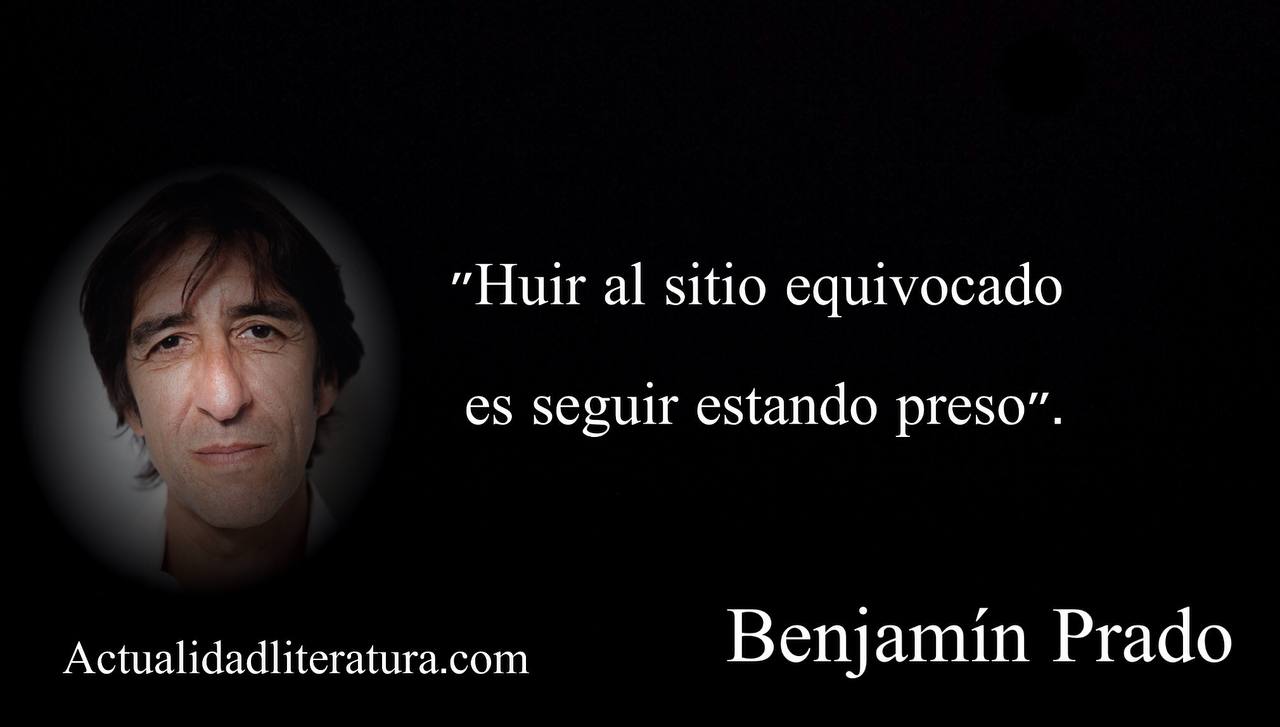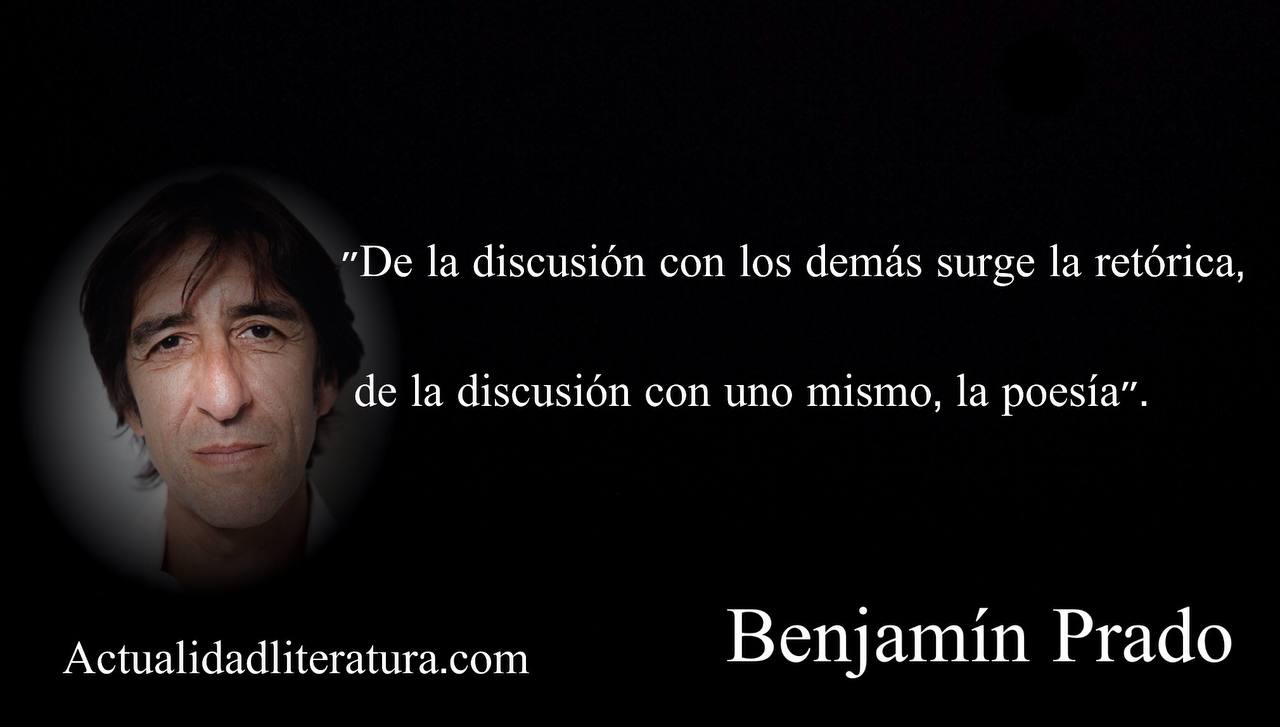
Benjamin Prado quote
Benjamín Prado is one of the most versatile Spanish writers with the greatest international reach today. Throughout his literary career, the Madrilenian has stood out as a poet, novelist and essayist, apart from being a columnist (of The country, mainly). Additionally, as a singer-songwriter he has collaborated with renowned musicians such as Joaquín Sabina or Amaia Montero, among others. in 1995 he won the Hyperion Prize for Poetry.
According to most scholars, Prado's written composition has many culturalist traits, a contemporary subgenre whose content includes abundant cultural references. These characteristics are observable in most of the work of the Iberian writer, who from 1986 to today has published 8 poetry books, 8 anthologies, 13 narratives and 8 essays.
About the Author
Benjamín Prado was born in Madrid on July 13, 1961. Regarding his childhood and youth, the writer has never been very willing to talk about it. For this reason, There is not much public information regarding the origins of the Madrilenian. Instead, he prefers to speak from his beginnings in literature, as reflected in the following statement:
"It makes me very hesitant to talk about childhood: for example, in the biographies or autobiographies of the authors that always seems to me the most annoying part, the least interesting. I want that Hemingway tell things from the moment you begin to be Hemingway. Because I think that, in the end and in some way, literature and a professional career are replacing life a little bit”…
(Excerpt from an interview granted to María Julia Ruiz in 2019).
Indeed, children and/or adolescents with relevant roles are practically non-existent in Prado's work. In this sense, the only exceptions are novels not only in the fire (1999) and Bad people who walk (2006) In the first, one of the characters (12 years old) is struck by lightning; in the second, the protagonist was robbed by the republican dictatorship during his childhood.
Work of Benjamin Prado
lyrical compositions
As described in previous paragraphs, Benjamín Prado's poetry has abundant cultural features. This quality has contributed to the praised —by most Spanish critics— the poet's ability to make the reader feel identified. Similarly, Prado does not usually address emotions in a general way in his sentences.
Actually, he prefers to delve into particular situations that have emotions as the protagonists of the action. In fact, the composer from Madrid declared to Tes Nehuén (2013) the following; “… if we want to write about sadness, it is better to write the story of someone who feels sad than to talk about that feeling in its broadest sense”.
Narrative
Prado is a man of letters with an obvious social commitment. Moreover, he has appeared in various social events and demonstrations against certain government decisions. Similarly, the Spanish writer has never “married” any political party and constantly repudiates corruption scandals carried out by public officials on social networks.
Moreover, the scars of Francoism are palpable in many passages of his novels. In accordance, in recent years the writer from Madrid has spoken out against far-right movements (VOX, for example). Likewise, he has earned the animosity of the Spanish ruling elite due to pronouncements such as the following:
"Normally there is talk of a fight, of a loss of places, but in reality what we are talking about is money, as always”. [Prado in an interview granted to Marina Velasco on the occasion of the publication of the novel the two kings (2022), referring to the difficult situation in Spain, Morocco and the Sahara].
The importance of music in his work
En Raro (1995) the acclaimed first novel by the writer from Madrid, Prado evidences his taste for rock music and, in particular, his admiration for Bob Dylan. Additionally, there are references to figures such as the Beatles, Mat Dillon or Nirvana, among many others, who are the artists around whom the life of a group of dissonant young people revolves.
Thus, despite the fact that this amalgamation of stories does not present a definite conflict, the author manages to capture the reader's interest in the life of each member of the story. Not in vain, the composer maintains that a song has the power to express all the world poetry. In fact, some of the most famous songs by his friend Joaquín Sabina bear the undeniable influence of Prado.
Between them:
- "When the cold presses" (1988);
- "This mouth is mine" (1994);
- "Tonight with you" (1994).
Other musicians with whom Benjamín Prado has collaborated
- Pancho Varona;
- Coke Mesh;
- Laziness;
- Ruben Well;
- Rebeca Jiménez.
The books of Benjamin Prado

Benjamin Prado quote
Scope
The work of the Iberian writer has been translated and published in countries such as the United States, the United Kingdom, Germany, Belgium, Denmark, Estonia, France, Greece, Hungary, Italy and Latvia. Equally, Prado's books have appeared in bookstores in Latin American nations such as Argentina, Chile, Mexico, Colombia, Cuba, El Salvador and Peru.
Published books
poem books
- a simple case (1986);
- The blue heart of lighting (1991);
- Personal issues (1991);
- Shelter against the storm (1995);
- All of us (1998);
- Iceberg (2002);
- Human tide (2006);
- it's not too late (2014)
Anthologies
- Poetry 1986-2001 (2002);
- my anthology (2007);
- here and then (2008);
- Don't tell me your life (2011);
- If you stop loving me, this poem will know (2012);
- I can only be with you or against me (2012);
- I had three mindsets: cities, rivers and rock and roll (2013)
Novels and other narratives
- Raro (1995);
- Never shake hands with a lefty gunslinger (1996);
- Where do you think you're going and who do you think you are (1996);
- someone is coming (1998);
- not only fire (1999);
- the snow is empty (2000);
- I will never get out of this world alive, stories (2003);
- Bad people who walk, The cases of Juan Urbano, 1 (2006);
- Operation Gladio, The Cases of Juan Urbano, 2 (2011);
- Reckoning, The cases of Juan Urbano, 3 (2013);
- What are you hiding in your hand, stories (2013);
- The thirty surnames, The cases of Juan Urbano, 4 (2018);
- The devil carries everything, The cases of Juan Urbano, 5 (2020)
Test
- Seven ways to say apple (2000);
- The names of Antigone (2001);
- In the shadow of the angel. 13 years with Alberti, memories (2002);
- with Teresa Rosenvinge: Carmen Laforet, biography (2004);
- with Joaquin Sabina: Break a song, about the composition of the album Vinegar and roses (2009);
- Pure logic, aphorisms (2012);
- Double bottom, aphorisms (2014);
- More than words, aphorisms (2015)